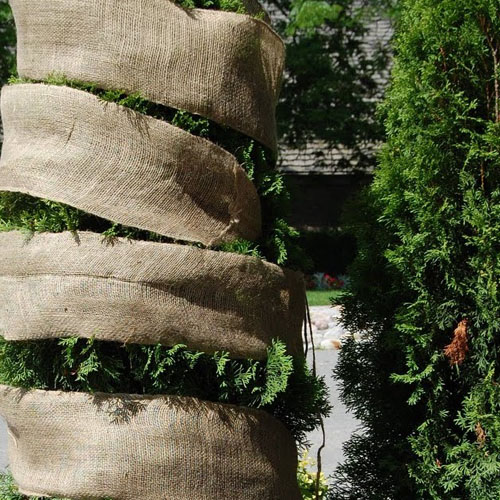Winterizing Tips
Those of us who love the outdoors and enjoy puttering around the yard are always looking for an excuse to do something in the fresh air. If you thought you were done with this year’s lawn and garden, we have a question: Have you taken care of the following?
- Wrapped cedars with two layers of burlap. Cedars nearest a road (and on the east side of it, especially where they are susceptible to westerly winds full of salt spray) are most vulnerable. Wrap them with a layer of burlap to prevent the permanent damage of salt and wrap them again to protect them from the drying effects of the wind, especially if they are exposed to the north or west.
- Fertilize your lawn. This time of year provides an opportunity to apply the most important application of lawn food. Why? Your lawn will absorb the nutrients of a fall lawn food before it goes to sleep for the winter. Like a bear that forages before bedding down for the winter, your lawn stores nutrients and sugars in its roots right now in anticipation of the long cold winter ahead. Look for a fertilizer formula, like CIL 12-0-18.
- Protect fruit trees. If we get an average dump of snow this winter, bunnies and mice can do a lot of damage to fruit trees that are less than 6 years old by nibbling away the bark with their rather sharp teeth. With little to fill their tummies in winter, they resort to this sort of thing. “Bark is better than nothing.” they must be thinking. Wrap the trunk of each tree with a plastic spiral that extends about a metre up the trunk. After about 6 years or so, the trunk of most trees has become too tough even for rodents to enjoy. Be sure to wrap crabapples and flowering cherries as rodents don’t know fruiting from non-fruiting trees that flower.
- Compost. All of your leaves are down and you no doubt have raked them off your lawn and on to your garden. Good. If you have a compost pile or bin, now is an excellent time to empty the contents onto your garden. Spread it with a rake and let it sit there over the winter. Come early spring, earthworms will pull the raw compost under the surface of the soil and convert it into nitrogen-rich castings (poop). If you have not built or purchased a compost, now is a good time to do it as there is no shortage of yard ‘waste’ (actually a ‘resource’), grass clippings and fallen leaves to fill it.
Rhododendrons and other wind-sensitive evergreens like taxus (yews) and boxwood, are best protected with one application of Wilt-Pruf. It prevents the drying effects of wind and extraordinarily low humidity during a Canadian winter. Save what is left in the bottle to apply to your fresh cut Christmas tree. It works better than ANY preservative.
For more information and to answer over 10,000 gardening questions, visit www.markcullen.com and sign up for Mark and Ben’s free monthly newsletter.


